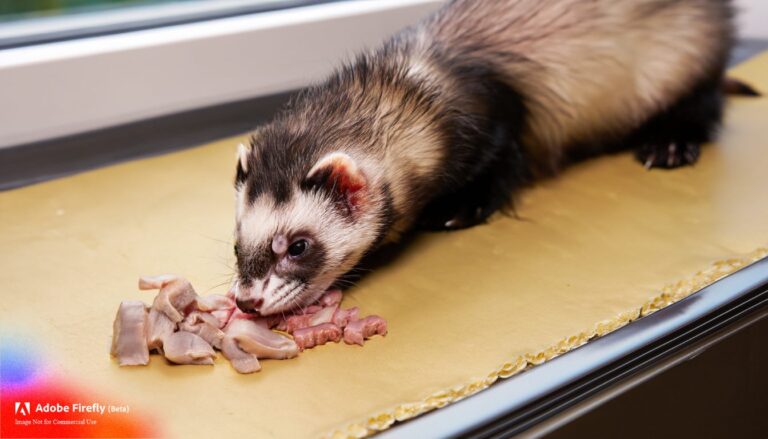
Are you a proud ferret owner? If so, you may have wondered about your furry friend’s eating habits. Do ferrets have a natural instinct to know when to stop eating? As an experienced ferret enthusiast, I’ve delved into this question to provide you with all the answers you need. Join me as we explore the fascinating world of ferret behavior and uncover whether these curious creatures have an innate sense of when to put down the food bowl.
When it comes to feeding our beloved ferrets, it’s important to understand their unique dietary needs. But do they possess the ability to self-regulate their food intake? In this article, we will delve into the topic of whether ferrets know when to stop eating or if they rely on their owners to monitor their portion sizes. From their natural instincts to their relationship with food, we’ll explore the factors that influence a ferret’s eating behavior. So, let’s dive in and uncover the truth behind the question: do ferrets know when to stop eating?
Understanding Ferret Eating Behavior
When it comes to understanding ferret eating behavior, there are a few key factors to consider. As an experienced ferret enthusiast, I have observed and researched this topic extensively. Here are some important points to keep in mind:
- Instinctual Behavior: Ferrets have a natural instinct to eat small meals frequently throughout the day. In the wild, ferrets are opportunistic hunters and scavengers, which means they are constantly on the lookout for food. This instinct carries over to their domesticated counterparts, and they tend to exhibit similar eating patterns.
- Food Preference: Ferrets are obligate carnivores, which means their diet should primarily consist of meat. They have a specific preference for animal-based protein, and their digestive system is designed to efficiently process and absorb nutrients from meat. This preference for meat-based food also influences their eating behavior, as they may eat more when presented with meaty treats or meals.
- Food Hoarding: Another interesting behavior to note is that ferrets have a tendency to hoard food. This behavior is believed to be a survival instinct, as they stash away extra food for times when it may not be readily available. It’s not uncommon to find hidden food stashes in various corners of a ferret’s enclosure.
- Social Influences: Ferrets are social animals and may be influenced by the eating behavior of their group. If one ferret starts eating, it can trigger a chain reaction and encourage others to join in. This group feeding behavior is often observed during mealtime or when treats are introduced.
- Portion Control: While ferrets may have a natural instinct to eat small meals frequently, it is important to monitor their food intake and provide appropriate portion sizes. Overfeeding can lead to obesity and health issues, so it’s essential to establish a feeding schedule and measure out the right amount of food for your ferret’s specific needs.
Understanding ferret eating behavior is crucial to providing them with a healthy and balanced diet. By recognizing their natural instincts and preferences, we can ensure that they receive the nutrition they need while also promoting good eating habits. So, next time you find your furry friend munching away, remember that their eating behavior is guided by both innate instincts and their domesticated environment.
The Role of Instincts in Feeding
Feeding behaviors in ferrets are heavily influenced by their instincts, which are ingrained in them due to their evolutionary history as carnivorous predators. These instincts play a significant role in determining when ferrets should stop eating.
1. Satiety Signals
Ferrets have a natural internal mechanism that tells them when they are full. This mechanism is triggered by the release of satiety hormones, such as cholecystokinin (CCK), which signal the brain that the stomach is stretched and it’s time to stop eating. The release of these hormones helps regulate the quantity of food consumed and prevent overeating.
2. Hunting and Scavenging Instincts
Ferrets have a strong instinctual drive to hunt and scavenge for food. In the wild, they would catch small prey or scavenge for leftovers to sustain themselves. This instinctual behavior has carried over to their domesticated counterparts. As a result, ferrets are wired to eat small, frequent meals throughout the day rather than consuming large amounts of food at once.
3. Food Hoarding
Another instinctual behavior observed in ferrets is food hoarding. In the wild, ferrets would stash their excess food to consume later during times of scarcity. Domestic ferrets still exhibit this behavior, often hiding or burying their food. This instinctual hoarding behavior can sometimes lead to overeating, as ferrets may continue to consume even when they are full.
Understanding these instincts is crucial in providing a balanced diet for ferrets. By mimicking their natural feeding habits as closely as possible, we can help them maintain a healthy weight and prevent obesity-related health issues.
It’s important to note that while instincts play a significant role in regulating feeding behavior, external factors such as the type and availability of food, social influences, and environmental conditions can also impact a ferret’s eating patterns. We’ll explore these factors in the next section.
Factors Affecting a Ferret’s Food Intake
When it comes to a ferret’s food intake, there are several factors that can influence how much they eat. Understanding these factors is essential in ensuring that your ferret maintains a healthy and balanced diet.
1. Size and Age
A ferret’s size and age play a significant role in their food intake. Smaller, younger ferrets typically require less food compared to larger, more mature ferrets. As ferrets grow, their nutritional needs change, so it’s essential to adjust their diet accordingly. Remember, it’s important to consult with a veterinarian to determine the appropriate portion sizes for your ferret based on their specific needs.
2. Activity Level
The activity level of a ferret can also impact their food intake. Ferrets are naturally active and playful creatures, and a more active ferret may require more food to maintain their energy levels. On the other hand, less active ferrets may need less food to prevent weight gain. It’s crucial to monitor your ferret’s activity level and adjust their food intake accordingly to ensure they are getting the right amount of nutrition.
3. Neutering or Spaying
Neutering or spaying can have an impact on a ferret’s food intake. After a ferret is neutered or spayed, their metabolism can slow down, resulting in a decrease in their overall appetite. To prevent weight gain and obesity, monitor your ferret’s food intake closely after the procedure and adjust accordingly.
4. Health Conditions
Certain health conditions can affect a ferret’s food intake. For example, gastrointestinal issues or dental problems may make it difficult for a ferret to eat comfortably. Additionally, some medications can affect appetite and digestion. If you notice any changes in your ferret’s eating habits, it’s essential to consult with a veterinarian to rule out any underlying health issues.
5. Feeding Schedule
Establishing a consistent feeding schedule is crucial for a ferret’s food intake. Ferrets have a natural instinct to eat small meals frequently throughout the day, mimicking their hunting and scavenging behavior in the wild. Dividing their daily food allowance into multiple smaller meals can help satisfy their instinctual need for frequent eating.
Can Ferrets Self-Regulate Their Eating?
When it comes to their eating habits, ferrets may struggle with self-regulation. Unlike some animals that naturally stop eating when they are full, ferrets do not have this innate ability. Instead, ferrets have a strong drive to eat and will continue eating if given the opportunity, even if they are already satisfied.
This lack of self-regulation can lead to some health issues for ferrets, such as obesity or gastrointestinal problems. It is important for ferret owners to closely monitor their pet’s food intake and take steps to prevent overeating.
To help prevent overeating, portion control is crucial. Feeding your ferret the appropriate amount of food for their size, age, and activity level will help prevent them from consuming excessive calories. It is also important to choose a high-quality ferret food that provides all the necessary nutrients without unnecessary fillers.
Feeding frequency is another important factor to consider. Ferrets have a natural instinct to eat small meals frequently throughout the day. Therefore, dividing their daily food portions into several small meals can help satisfy their need to eat while preventing overconsumption.
Additionally, it is essential to avoid free-feeding. Leaving food available at all times can tempt a ferret to eat continuously, leading to weight gain and other health issues. Instead, establish a regular feeding schedule and remove any uneaten food after each meal.
In some cases, individual ferrets may have different eating patterns. While some ferrets may eat quickly and voraciously, others may be more selective or have a slower eating pace. For those ferrets who tend to eat too quickly, using puzzle feeders or slow feeders can help slow down their eating, making them more aware of their food intake.
Overall, while ferrets may not have the natural ability to self-regulate their eating, it is essential for their owners to take the necessary steps to prevent overeating. By practicing portion control, establishing a feeding schedule, and monitoring their food intake, ferret owners can ensure that their furry friends maintain a healthy weight and overall well-being.
The Importance of Monitoring Portion Sizes
As a responsible ferret owner, it’s important to monitor and control the portion sizes of your furry friend’s meals. Since ferrets do not have the ability to self-regulate their eating, they may continue to eat even when they are already satisfied. This lack of self-control can lead to health issues such as obesity and gastrointestinal problems.
To prevent overeating, portion control is crucial. By measuring and providing the appropriate amount of food, you can ensure that your ferret gets the nutrients they need without overconsumption. Overfeeding can have serious consequences for ferrets, so it’s essential to avoid free-feeding.
Establishing a regular feeding schedule is also important. Feeding your ferret at the same time each day helps to promote a sense of routine and helps prevent excessive snacking or begging for food. Consistency is key when it comes to feeding your ferret to maintain a healthy weight.
When determining the portion size for your ferret, it’s essential to take their age, weight, and activity level into consideration. Consulting with your veterinarian can help you determine the appropriate amount of food for your specific ferret.
In addition to monitoring portion sizes, it’s crucial to remove any uneaten food after each meal. Leaving food out for extended periods can lead to spoilage or attract pests, putting your ferret’s health at risk. By cleaning up after mealtime, you can ensure that your ferret is always eating fresh and wholesome food.
Overall, carefully monitoring and controlling portion sizes is essential to maintain a healthy and balanced diet for your ferret. By providing the right amount of food and establishing a regular feeding schedule, you can help your furry friend maintain a healthy weight and overall well-being.
Conclusion
It is crucial to closely monitor and control the portion sizes of a ferret’s meals. Ferrets lack the ability to self-regulate their eating, which means they may continue to eat even when they are already satisfied. This can lead to various health issues, including obesity and gastrointestinal problems. To prevent overeating, it is important to practice portion control and provide the appropriate amount of food for your ferret. Additionally, establishing a regular feeding schedule can help promote a sense of routine and prevent excessive snacking or begging for food. Remember to consider your ferret’s age, weight, and activity level when determining the portion size. Finally, always remove any uneaten food after each meal to ensure that your ferret is always eating fresh and wholesome food. By carefully monitoring and controlling portion sizes, you can help your ferret maintain a healthy weight and overall well-being.






